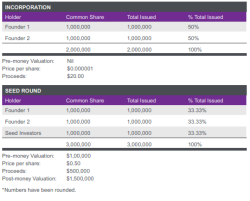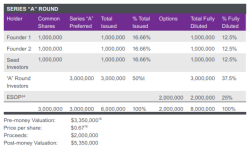Startup valuations and cap tables
How does valuation reflect the cap table?
As part of any equity financing, the startup and the investor must agree on the value of the company. This valuation is usually referred to as the pre-money valuation, as it represents the value of the company before infusing cash from investors. While there are a number of formal value methods to calculate the value of a business, the usefulness of such methods for startups (i.e., with no revenue and few assets) is sometimes questionable. Realistically, the valuation process for startups usually unfolds with investor(s) estimating how much money will be required to fund the company’s operations up to a specific milestone (e.g., initial product completion or first market trial) and then equating that amount to a percentage of the company that the investor(s) expect to receive (e.g., 30-40 percent).
The amount of money to be invested and the corresponding percentage of ownership that will be acquired by the investors will depend upon the stage of development of the company and the amount of capital that the corporation is expected to require before it becomes self-sufficient.
The following tables illustrate how valuation impacts the capitalization of a hypothetical company from its inception to its Series A financing:
Existing investors will always want to see as high a pre-money valuation as possible. However, don’t fixate on valuation to the exclusion of other elements of the term sheet. A high pre-money valuation can become much less attractive if the rest of the term sheet is brutal.
Questions? Email us at startups@dentons.com.




 ©2019 Dentons
©2019 Dentons